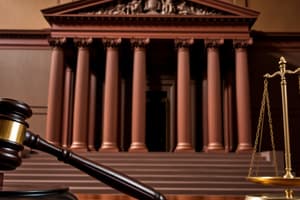Podcast
Questions and Answers
What does the Infancy Defense doctrine state?
What does the Infancy Defense doctrine state?
- All children are subject to criminal prosecution.
- Young children are incapable of forming a culpable mental state. (correct)
- Very young children are fully culpable for their actions.
- Children's actions are always treated as misdemeanors.
Judicial Review allows the Supreme Court to evaluate the constitutionality of legislative enactments.
Judicial Review allows the Supreme Court to evaluate the constitutionality of legislative enactments.
True (A)
What is the primary function of a legislature?
What is the primary function of a legislature?
To make laws
The _____ Code specifies crimes and their punishments.
The _____ Code specifies crimes and their punishments.
Match the following terms with their definitions:
Match the following terms with their definitions:
Which branch of government is responsible for law-making?
Which branch of government is responsible for law-making?
SCOTUS stands for the Supreme Court of the United States.
SCOTUS stands for the Supreme Court of the United States.
What does Procedural Due Process ensure?
What does Procedural Due Process ensure?
A negotiated agreement to plead guilty is known as a _____ bargain.
A negotiated agreement to plead guilty is known as a _____ bargain.
Which of the following best describes an Unconstitutional law?
Which of the following best describes an Unconstitutional law?
What is the primary function of an appellate court?
What is the primary function of an appellate court?
The Bureau of Justice Statistics only collects data on convicted offenders.
The Bureau of Justice Statistics only collects data on convicted offenders.
What is the role of the Executive Branch in the government?
What is the role of the Executive Branch in the government?
The ______ is a comprehensive set of laws arranged by subject.
The ______ is a comprehensive set of laws arranged by subject.
Match the following terms with their definitions:
Match the following terms with their definitions:
Which term describes the constitutional guarantee of fair treatment?
Which term describes the constitutional guarantee of fair treatment?
Efficiency in the justice system refers to the use of available resources to improve public safety.
Efficiency in the justice system refers to the use of available resources to improve public safety.
What is the purpose of the Criminal Code?
What is the purpose of the Criminal Code?
The legislative branch of the United States government is known as ______.
The legislative branch of the United States government is known as ______.
What does Dual Federalism refer to?
What does Dual Federalism refer to?
Flashcards are hidden until you start studying
Study Notes
Appellate Court
- A court that reviews and hears cases from trial courts for a second evaluation.
Bureau of Justice Statistics (BJS)
- Collects, analyzes, and disseminates data on crime, offenders, and victimization.
Code
- A structured compilation of laws organized by specific subjects.
Common Law
- Legal system originating in England, heavily based on judicial decisions and precedents.
Congress of the United States
- The legislative branch consisting of the U.S. House of Representatives and the Senate.
Constitution
- A fundamental document outlining the principles governing a nation or state.
Criminal Code
- Segment of the United States Code or individual state codes that addresses criminal law.
Judicial Decisions
- Written opinions from appellate courts that serve as binding law in common law jurisdictions.
Dual Court System
- Characterizes the U.S. legal framework as comprised of both state and federal courts.
Dual Federalism
- National and state governments operate independently with distinct powers.
Due Process
- Constitutional protection ensuring fair treatment of defendants in the justice system.
Effectiveness
- Measure of how justice system activities uphold equity, proportionality, and defendant rights while maintaining public safety.
Efficiency
- Utilization of resources to achieve legal goals and enhance public safety economically.
Executive Branch
- Government branch responsible for enforcing laws and managing public affairs.
Fairness
- Focus on equal treatment of offenders and balanced considerations during sentencing.
Federal Rules of Criminal Procedure
- Regulations established by the Supreme Court governing federal criminal prosecutions.
Hierarchical
- Describes an organizational structure where elements are ranked by importance or authority.
Infancy Defense
- Legal doctrine asserting that very young children cannot have a culpable mental state, protecting them from prosecution.
Judicial Review
- Authority of the Supreme Court to assess the constitutionality of legislative acts.
Judiciary
- The collective court system of a country or state, encompassing judges and their roles.
Juvenile Justice
- Legal provisions aimed at addressing offenses committed by individuals below the adult age threshold.
Legislature
- Elected body with constitutional power to enact laws, such as Congress.
Nonsystem Argument
- Perspective that highlights the conflict among components of the criminal justice system, suggesting a lack of cohesive operation.
Penal Code
- Collection of laws defining crimes and associated penalties, relevant to substantive criminal law.
Plea Bargain
- Agreement where a defendant pleads guilty to a lesser charge in exchange for more lenient sentencing.
Procedural Due Process
- Concept ensuring fairness in the treatment of individuals within the criminal justice system.
SCOTUS
- Abbreviation for the Supreme Court of the United States, the nation's highest court.
Three Branches of Government
- The U.S. government consists of the executive, legislative, and judicial branches as established by the Constitution.
Unconstitutional
- Actions or laws that violate the provisions set forth in the U.S. Constitution or state constitutions.
United States Supreme Court
- The apex court in the U.S., consisting of eight associate justices and one chief justice.
Studying That Suits You
Use AI to generate personalized quizzes and flashcards to suit your learning preferences.




